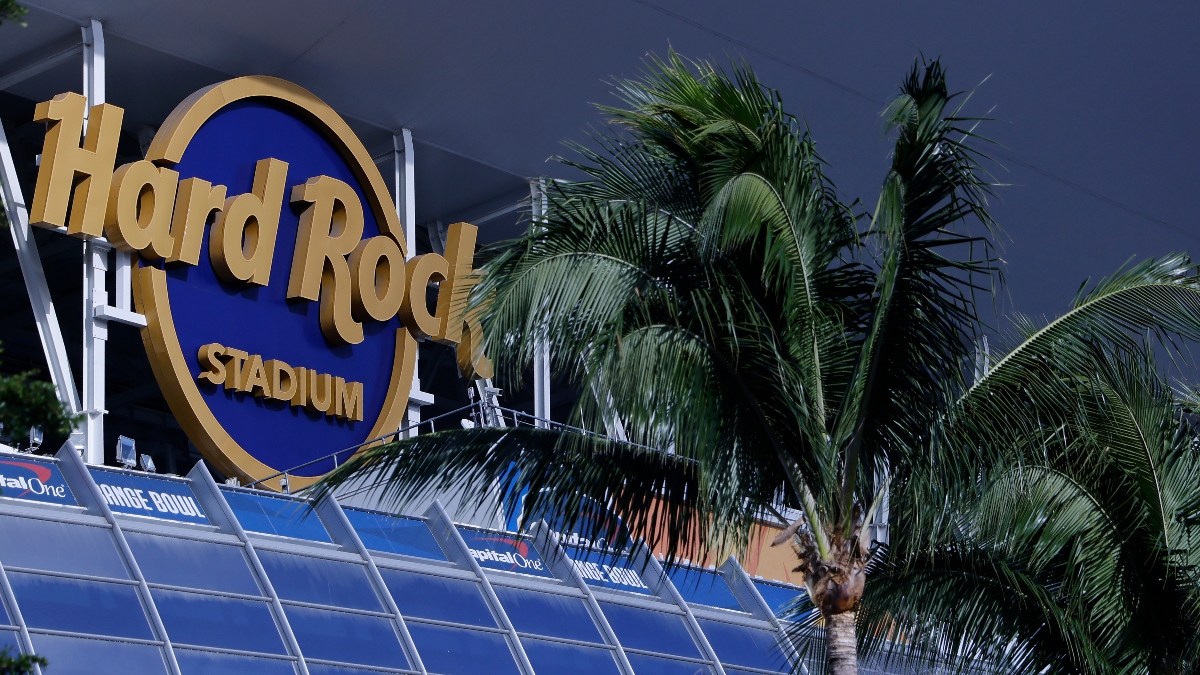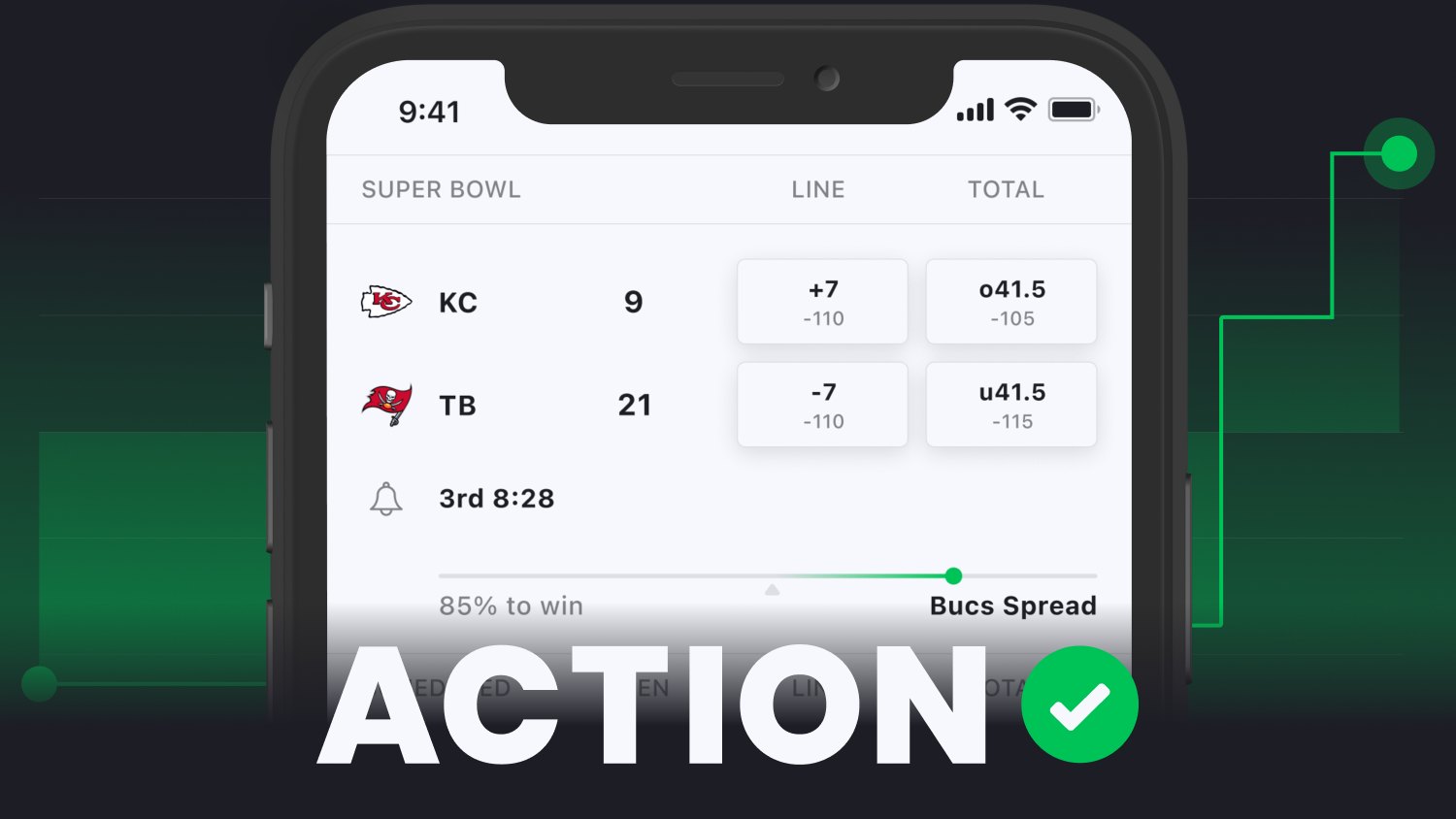Florida Online, Retail Sports Betting Approved in Groundbreaking Gaming Deal
Michael Reaves/Getty Images. Pictured: Miami’s Hard Rock Stadium.
Florida officials announced a sweeping gaming deal on Friday that legalizes statewide mobile sports betting and some of the nation’s first in-stadium sportsbooks while facing multiple logistical and possibly legal challenges before implementation.
The new gaming compact struck by Florida Gov. Ron DeSantis and the Seminole Tribe of Florida will allow the tribe to open statewide mobile sports wagering, as well as retail sportsbooks. Final details had not been released publically at the time of publication, but retail sportsbooks are expected to be permitted at certain professional sports venues, as well horse tracks, card rooms and other gaming facilities.
House Speaker Chris Sprowls confirmed the deal from the House Floor Friday afternoon.
After years of stalled negotiations, the new compact will expand Florida’s gaming options and create one of the nation’s largest sports betting customer bases. Florida is the third-most populated state in the country and the largest to approve legal wagering. It is also one of the nation’s most visited states, drawing more than 100 million annual tourist visits.
The deal is still subject to federal and statewide approval and could face legal challenges and even a possible voter referendum before bets can be placed. But Friday’s announcement clears the most substantial political hurdle preventing what would be the most populated state with legal sports betting.
“The Seminole Tribe of Florida is committed to a mutually beneficial gaming compact with the State of Florida and looks forward to its approval by the Florida Legislature, the Seminole Tribal Council and the U.S. Department of the Interior,” Seminole Tribe of Florida Chairman Marcellus Osceola Jr. said in a statement to the Miami Herald Thursday.
Deal Could Mean Two Online Sportsbooks
Sources told The Action Network on Thursday that the deal would include two online licenses, or “skins,” both of which would be run by the Seminole Tribe and one of which would be for the tribe’s Hard Rock brand. It remains to be seen which sportsbook would earn the second skin or how the winning recipient would be determined.
Any regulated online sports betting option is good news for legal wagering, especially after state officials seemed as recently as last month they were deadlocked on any gaming progress. However, the proposed two-skin market would be a major blow to not just the vast majority of U.S. operators but Florida sports bettors.
Industry analysts worry such a limited market would limit customers’ betting options and disincentivize the legal books to offer competitive lines, bonuses or promotions. This in turn funnels would-be legal customers back to the black market. New York’s proposed online market, which could license as few as four statewide mobile sportsbooks, was heavily criticized by many gaming industry officials.
The deal could bring dozens of retail sportsbooks across the state’s myriad horse tracks, former greyhound facilities, jai alai venues and other gaming entities, but online betting makes up as much as 80% or more of betting handle in most mature markets.
Stadium Sportsbooks
Florida could also be among the first, and most consequential, states with in-stadium sportsbooks.
William Hill operates the nation’s only current retail stadium sportsbook at Capital One Arena in Washington D.C. Illinois venues, including the Chicago Cubs’ Wrigley Field, have announced stadium sportsbooks plans, and Maryland and Arizona passed bills this month that permit their respective professional sports teams and organizations to do the same.
It’s unclear at which sports venues would open retail sportsbooks or be able to do so under the deal, but it opens the door for several high-profile stadium sportsbooks in some of the nation’s largest metro areas. The Seminole Tribe already has a naming rights deal with Miami Gardens’ Hard Rock Stadium, which has hosted multiple Super Bowls and NCAA football championship games.
Other likely sportsbook city candidates include:
- Miami: American Airlines Arena (NBA’s Miami Heat); loanDepot park (MLB’s Miami Marlins)
- Tampa: Raymond James Stadium (NFL’s Tampa Bay Buccaneers); Amalie Arena (NHL’s Tampa Bay Lightning)
- St. Petersburg: Tropicana Field (MLB’s Tampa Bay Rays)
- Jacksonville: TIAA Bank Field (NFL’s Jacksonville Jaguars)
- Orlando: Amway Center (NBA’s Orlando Magic)
- Sunrise: BB&T Center (NHL’s Florida Panthers)
Arizona is the only state to approve sportsbooks for PGA TOUR and NASCAR events. Florida hosts multiple PGA TOUR events each year, including The Players Championship in Ponte Vedra Beach. The state also houses two of NASCAR’s premier events, the season-opening Daytona 500 and the Dixie Vodka 400 at Homestead-Miami Speedway.
Florida’s two largest team sports venues by capacity are the University of Florida’s Ben Hill Griffin Stadium and Florida State University’s Doak Campbell Stadium, but no state has approved in-stadium sportsbooks for college sports venues. It also seems unlikely Florida would approve sportsbooks for its spring training stadiums and minor-league sports stadiums.
Florida Sports Betting Breaks Gaming Impasse
Sports betting is a small part of a much larger deal that could drastically expand Florida’s gaming options.
The Seminole Tribe, which already operates seven Florida gaming facilities, including Hard Rock casinos in Tampa and South Florida, will be able to offer craps and roulette, expanding into full “Las Vegas-style” casinos. The Seminoles will also be able to open new gaming facilities on tribal lands.
In exchange, the tribe will reportedly agree to pay as much as $600 million annually to the state as part of a 30-year deal. The tribe halted roughly $300 million in annual payments several years ago, arguing certain table games offered at state card rooms violated the tribes’ exclusivity rights in the previous compact.
These card rooms will be able to continue offering these card games under the deal. These facilities can also open sportsbooks, but the Seminoles will receive a portion of betting revenues.
Legislative, Legal Challenges Remain
The deal now goes to the Florida Legislature for approval.
DeSantis and Senate President Wilton Simpson, who helped negotiate the deal, have reportedly pushed for ratification before the regularly scheduled 2021 legislative session concludes this month, but lawmakers will take up a special session to address the compact, and potentially other gaming issues beginning the week of May 17. With DeSantis, a Republican, pushing the deal, it shouldn’t face much political difficulty in the GOP-controlled legislature.
“Gaming, in one form or another is a voter-approved legacy industry in our state that has contributed billions of dollars to our economy for education, health care and infrastructure, while providing hundreds of thousands of jobs to Floridians over the courts of nearly 100 years," Simpson wrote in a memo to Senate colleagues after the deal was announced Friday. " In my view, we have a responsibility to update our laws to reflect current realities of this heavily-regulated industry and to ensure those laws are properly enforced.”
“Florida is a diverse state and our Senators and constituents have many different opinions, beliefs and convictions regarding gaming. The fact remains, Florida has a significant gaming footprint, and I think it we are going to regulate these activities, it should be within a structure that is fair and equitable to all parties.”
The Department of the Interior would also need to approve the deal. Commercial and tribal gaming officials have praised Secretary Deb Haaland, the first Native American to hold the position, a sign the deal won’t face federal opposition. However, federal tribal gaming law has not previously permitted the Seminoles’ plans to offer statewide mobile wagering by placing servers on their lands, setting up a possible legal challenge.
Opponents further argue the deal violated a 2018 state constitutional amendment that prohibits lawmakers from passing casino gaming laws without voter approval. Supporters have argued sports betting was not a common casino game in 2018 and not subject to any challenge, but it still opens another possible legal front that could prohibit sports betting.
This further complicates what remains a complex path forward for legal Florida sports betting, likely impeding the first bet for months and possibly years. Friday’s major announcement clears the most important political issue but significant work remains.
How would you rate this article?


